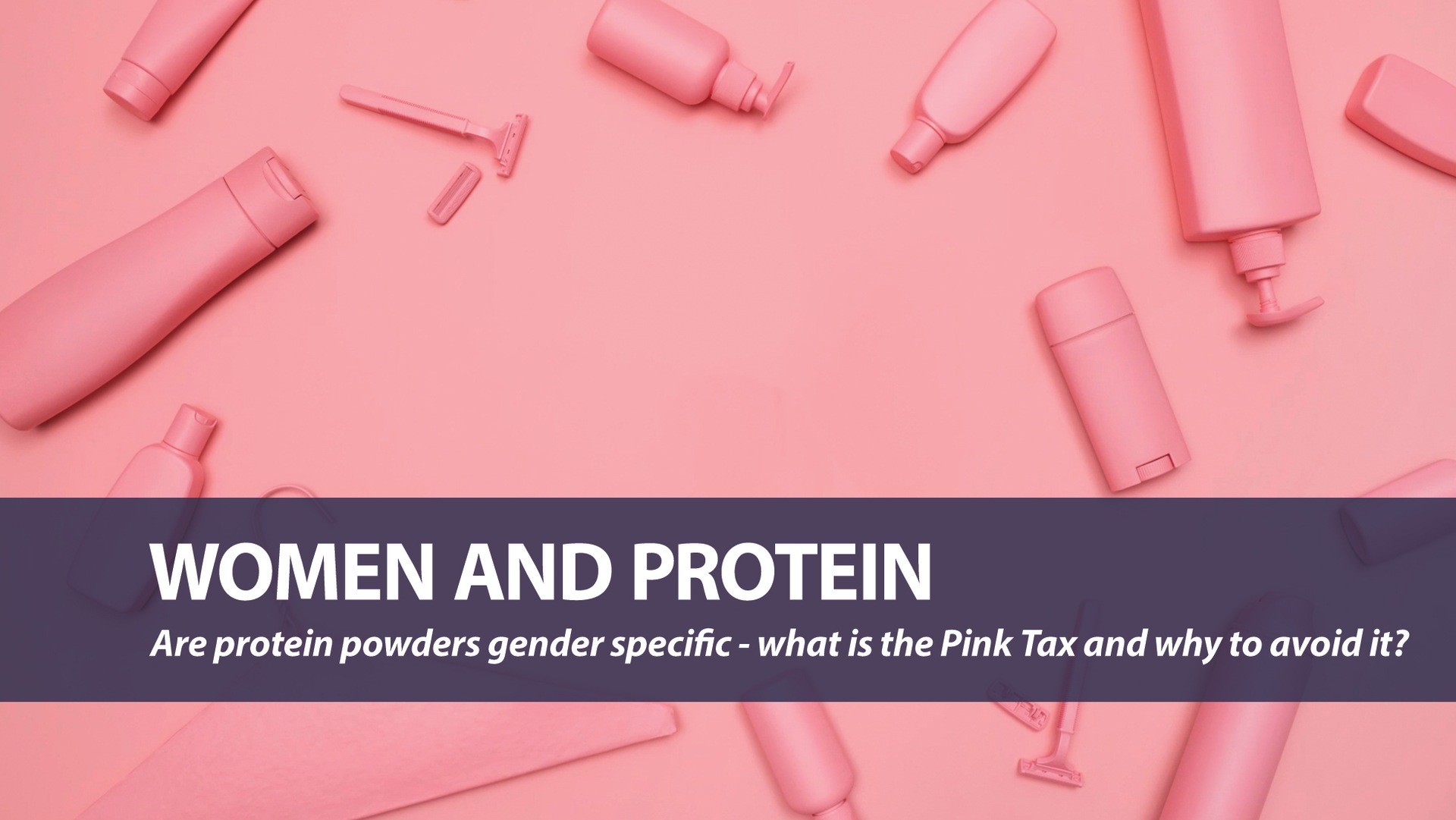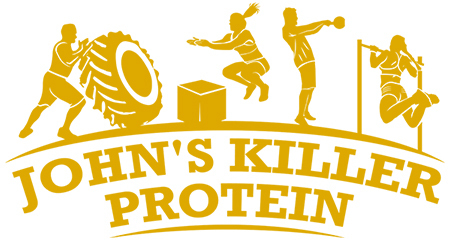 Women and Protein: Are protein powders gender specific?
Women and Protein: Are protein powders gender specific?
If you’re a consumer in the US, you’ve most likely heard of the Pink Tax. The Pink Tax is a term used to describe the additional costs paid for items marketed to women that are similar, if not identical to items marketed to men. Companies target women shoppers through crafty names, special description or packaging and will often charge more for these items with ridiculous claims that they are formulated specifically for women and are somehow better for the women who buy them.
To put this in perspective, women pay $1,351 more per year for items that are similar to those purchased by men, with differences being very subtle like the scent of a deodorant, flavor of a protein powder or the color of a shirt. This practice of charging more for items marketed towards women is not new; one of the first exposes that shed light into this practice was published by Forbes and dates back to 2010.
In 2015, The NYC Department of Consumer Affairs published an eye opening study that showed women pay more when buying everyday items ranging from personal health goods such as shampoo, razors and deodorant, to vitamins and supplements, fitness gear, to toys and clothing. In April 2018, California Congresswoman Jackie Speier re-introduced the Pink Tax Repeal Act—a bill that would prohibit companies from charging different prices for similar products or services simply based on the gender of the customer.
What does this have to do with protein powders and supplements?
You may ask yourself… why in the world are we talking about the Pink Tax here, and what does this have to do with protein powders or supplements. You see, this practice of targeting women with marketing gimmicks and unbacked claims to generate higher profits and increase market share is now a real problem within the health and fitness industry.
Today, there are dozens of companies making protein blends and other supplements that specifically target women through clever packaging, crafty names, and other marketing gimmicks. These companies make claims that their products are specifically formulated for women and are somehow better for women than the same products sold to men. By doing this, these companies are hoping to create the feeling that their products are a specialty item created for the female shopper. They are betting on attracting more female customers and charging slightly higher prices for what are essentially the same products sold to men.
The simple truth is that there is absolutely no correlation between gender and our body’s ability to digest and utilize food, protein powders or supplements. There are only two exceptions to this. The first being prescription drugs that alter hormone levels with such drugs being prescribed legally by a licensed physician, or banned performance enhancing drugs obtained illegally (read steroids). The second exception being a handful of vitamins that may be slightly – and we emphasize the words “may be slightly” because research on this topic is inconclusive – more beneficial for women as compared to men. In other words, any vitamin that is good for women will be equally good for men. Collagen supplements, Iron, Folic Acid, Vitamin E, and Vitamin B, are typically marketed to women, but research has always shown that these vitamins are equally beneficial for both men and women.
Ok, but what about protein?
Given our space in the industry, we’re going to focus the rest of this article on protein powders and protein supplements.
Over the past year, we’ve come across dozens of protein companies that will simply slap a pink label on a protein bottle, or use colors, logos and fonts they consider appealing to women in vain attempts to gain market share or be able to charge more for their products. Some companies we’re familiar with have even gone as far as doing complete re-branding specifically to target women, while selling exactly the same products as before.
These companies will almost always make ridiculous claims that their brand is “formulated for women” or is “ideal for women” promising the female consumer some type of “edge” over similar and competing products marketed to men or products that are gender neutral. This couldn’t be further from reality.
Isn’t it true that women have different supplementation needs?
The short answer is, No. When it comes to supplementation, there is a lot of buzz around those related to women vs. men, as though they are different. Research consistently shows that both men and women, from a physiological perspective break down food, amino acids and supplements the same exact way. The only difference is body size and composition – meaning a 190 pound male will have different nutrition and supplementation needs compared to a 125 pound female, not because of gender, but because of body mass and tissue composition.
To fully answer this question, we need to first get a little background on what protein really is. In its purest form, protein is made up of organic compounds called amino acids. Amino acids combine in different ways to form protein. These amino acids and the proteins they form are the building blocks of life, equally so in both men and women!
When protein is eaten, and digested, amino acids are left. The human body, regardless of gender, uses these amino acids the same way to:
- Break down and digest food
- Repair all body tissue (not just muscle tissue)
- Repair and grow muscle tissue
- Perform many other body functions important to a healthy lifestyle
These amino acids found in protein are classified into three groups:
- Essential amino acids: Amino acids that cannot be made by your body and must be obtained through food we consume. There are 9 essential amino acids; they are histidine, isoleucine, leucine, lysine, methionine, phenylalanine, threonine, tryptophan, and valine. Of these 9 essential amino acids, 3 are Branched Chain Amino Acids, or BCAA’s. These BCAA’s are isoleucine, leucine and valine.
- Nonessential amino acids: Amino acids that are produced by our bodies, even if we do not get them from food we eat. There are 5 nonessential amino acids. They are alanine, asparagine, aspartic acid, and glutamic acid.
- Conditional amino acids: Amino acids that are typically non-essential, meaning your body will make them naturally even when not obtained through food, EXCEPT in times of illness and stress. When your body is ill or you are under stress, your body has been shown to not product these Conditional Amino Acids, meaning you should be getting them from the food you eat. There are 8 conditional amino acids; they are arginine, cysteine, glutamine, tyrosine, glycine, ornithine, proline, and serine.
Branched Chain Amino Acids (BCAA’s) are a part of essential amino acids. There are three BCAA’s that your body cannot make on its own, and must be consumed through a clean protein supplement or food. These are Isoleucine, leucine, and Valine. A high quality, protein powder like John’s Killer Protein® will have all the required amino acids, both essential and non-essential, and enough naturally occurring BCAA’s so you wouldn’t require separate BCAA supplementation. For example, our Grass Fed Irish Whey Isolate contains 5 grams of BCAA’s per serving. These amino acids can also be used as a source of energy just like fat or carbohydrates, again by both men and women and in the same exact way. More on the topic of BCAA’s in our upcoming article, so stay tuned!
To be clear, Some studies have shown that women may metabolize food slower and burn fat at a lesser rate than men, and that men are able to metabolize food (and burn fat) at a faster rate than women. However, the overwhelming consensus is that this is due to body mass composition and not gender, meaning a taller more muscular male may indeed burn more fat than a shorter less muscular woman. It is also correct to say that a taller more muscular woman will metabolize food at a faster rate and burn more fat than a shorter less muscular man.
Whey protein for women (Hint: it’s the same as for men!)
Whey protein provides instant fast-digesting amino acids. A pure and clean protein powder should pack a good amount of protein per scoop – our pure protein blends have over 20 grams of amino acids per scoop. Women who train or just want to meet their basic protein needs understand the importance of protein in daily life. An unflavored, unsweetened whey protein is one of the best and purest sources of amino acids, period!
Men and women can consume the same whey protein, and will digest and utilize its amino acids the same way. Differently said, our human body, whether male or female will break down and digest protein and its benefits the same way.
Some companies who target women tend to simply lower their protein content-per-serving by putting a smaller size scoop in their container and to say that the requirement of protein for females is different than males. While that may be true, needing less of something is not the same as that something being fundamentally different. Any difference in protein requirement is due to the actual body composition, height, weight, etc. never gender. Because, on average, women tend to weigh less than men – and we emphasize the words “on average” – women would theoretically require less protein per day. Changing the size of a scoop/serving does not mean the product is different or formulated to be better for women. Also, adding some vitamin powder to a protein blend does not fundamentally make the protein any different. You’d be better off purchasing a multivitamin complex better suited for your specific goals and consuming that separately from your protein powder.
In other words, protein for men and women is the same product, is broken down and digested the same, and will yield the same benefits for both genders.
Myths associated with whey protein consumption by women
Some of these companies who target women for higher profits or market share will also engage in fear-mongering to differentiate or charge more for their products. They rely on misinformation and long-ago disproven “protein myths” to convince their target female shoppers that their products are formulated for, and therefore safer to consume by women!
Let’s address the top 4 myths associated with protein powders that are typically exploited by companies targeting female shoppers:
Myth 1: High protein intake will increase your testosterone levels:
Both Men and Women have testosterone levels. Testosterone is the driving force for muscle development. In Men, the testosterone levels are between 0.95-4.3 pg/dl. In Women that level is between 0.7-3.6 pg/dl. Women’s free testosterone levels are lower as compared to men. Testosterone levels are mostly increased as a result of high carb and fat diets. Consumption of whey or any other protein source does not interfere with testosterone levels.
Myth 2: Whey protein is only required for those who train, and train hard:
Most people consider protein supplementation as needed only to build lean muscle mass after training. That’s simply not true. Any individual requires a certain amount of protein to sustain normal and healthy body functions. For Women, the lowest recommended limit is 56 grams of protein per day.
Myth 3: Whey protein powders create kidney issues:
This myth has been around for some time now and there are almost no studies to prove this point. Even the consumption of over 2 grams of protein per pound of bodyweight has not shown any adverse effects on the kidneys.
Myth 4: Whey protein consumption will make Women bulky and increase their weight:
Whey protein promotes lean muscle mass – it doesn’t make you bulky. For Women who work out, consuming whey protein and protein-rich food helps reduce fat, promotes lean muscle mass and reduces cravings for sugary foods. Gaining weight is a result of eating diets high in carbs and fats, not protein. Whey protein consumption ensures all the essential amino acids required for healthy living are available.
Moreover, as is now commonly understood, women simply don’t have the natural hormones of men to get huge and bulky!
What does this all mean?
To say it simply, there are no differences between how men and women break down or utilize protein powders and supplements. Protein powders cannot be fundamentally formulated to be “better” for one gender vs. another.
You should choose your protein based on your specific fitness goals, not your gender. For example, if your goal is to bulk up, choose a protein blend that is high in carbs or healthy fats. If your goal is to slim down and build lean muscle mass, choose a protein blend that is fat free and carb free. There are of course many factors that affect your recommended daily protein and supplement requirements. Those factors are not gender based – meaning it does not matter if you are a man or woman, they are strictly factors such as your age, body composition, height, weight and overall lifestyle. Your gender has no impact on your food, protein or supplement needs.
When choosing a protein powder, avoid protein powders that are high in sodium, added sugars, contain Soy Lecithin, flavors, additives, emulsifiers or artificial sweeteners or ingredients.
Final thoughts
Next time you see a pink label, ask yourself if what you’re being promised is true. Reach out to the company promoting that product and ask them to support any claims they make that their products are “formulated for women” or better for you as a female shopper.
Compare prices and choose a protein supplement based on your specific fitness goals, not your gender. Do you have any questions or feedback on this article? We’d love to hear from you – leave us a comment below or contact us here.

